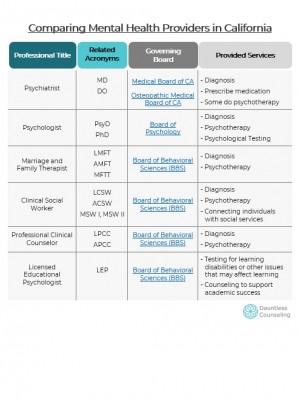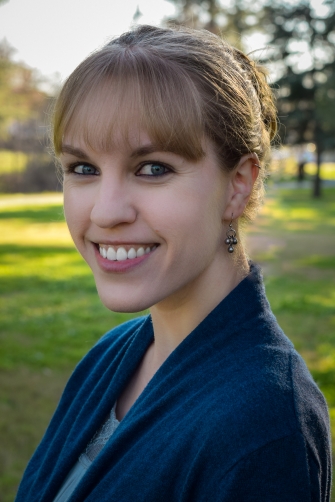Have you ever tried to look up a mental health provider, seen a bunch of letters after their name and thought, “What does that even mean?” All these acronyms can be confusing, even to those who work in the mental health field.
If you’d like to learn the difference between a psychiatrist, a psychologist, an LMFT, an LCSW, an LPCC, and an LEP, then keep reading.
Please Note: This article is specific to mental health providers in California, although there may be some similarities or overlap between these titles and acronyms and ones in other states or countries.
Table of Contents
- What’s the Difference Between a Psychiatrist and a Psychologist?
- What’s the difference between an LMFT, an LCSW, an LPCC, and an LEP?
- Marriage and Family Therapists
- Clinical Social Workers
- Professional Clinical Counselors
- Educational Psychologists
- What Do Psychiatrists, Psychologists, LMFTs, LCSWs, LPCCs, and LEPs Have in Common?
- How are Psychiatrists, Psychologists, LMFTs, LCSWs, LPCCs, and LEPs Different?
- Mental Health Providers in Other States
- A Final Note

What’s the Difference Between a Psychiatrist and a Psychologist?
Psychiatrists (MD, DO)
A psychiatrist is a person with a medical degree who received further training in the treatment of psychiatric (or mental health) conditions. They can prescribe medications to treat various mental health problems as well as provide psychotherapy and other interventions, such as TMS or ECT.
Becoming a Psychiatrist:
Psychiatrists will usually have either “MD” or “DO” after their name. MD stands for Doctor of Medicine. DO stands for Doctor of Osteopathic Medicine. While similar, DOs tend to have a more holistic approach.
During the last 2 years of their medical degree, psychiatrists will gain hands-on medical experience in various departments (this is called clinical rotations). After graduation, psychiatrists must complete 4 years working as a resident specializing in psychiatric medicine. Some psychiatrists will also go on to complete a fellowship program to earn more in-depth training in a certain specialty, such as addiction.
In order to become licensed, psychiatrists must pass both a Medical Licensure Exam and a Certification Exam specializing in psychiatry.
Terms Related to Psychiatrists
| MD | Someone who has earned a degree as a Doctor of Medicine |
| DO | Someone who has earned a degree as a Doctor of Osteopathic Medicine |
| Medical Intern | Someone who is completing the hands-on work necessary to earn their degree in the field of medicine |
| Medical Resident | Someone who has completed their degree is and is now finishing the required 4 years of fieldwork and exams required to become licensed |
| Medical Fellow | Someone who has obtained their medical license and decided to continue their training in a specialty field |
| Attending | Someone who has obtained their medical license and is a practicing doctor |
| Psychiatrist | Someone who has become licensed as a psychiatrist and can now prescribe medications and provide other mental health interventions such a therapy, TMS, or ECT |
Psychologists (PsyD, PhD)
A psychologist is a person with a doctorate degree who can provide mental health therapy (also known as psychotherapy), psychological testing, or both.
Becoming a Psychologist
Psychologists will have either “PsyD” or “PhD” after their name. Someone with the letters “PsyD” after their name has earned a degree as a Doctor of Psychology. Someone with a “PhD” earned a degree as a Doctor of Philosophy, with a focus in psychology. Both degrees provide the necessary education to do the job of a psychologist.
Psychologists must complete both a dissertation (or an original research project) and 3,000 hours of work in their field under a licensed supervisor before becoming licensed themselves. The supervisor is there to help guide and support them until they take the exam to become licensed.
Some of the required 3,000 hours may be completed pre-graduation. During this time, psychologists are called pre-doctoral interns. The rest of these hours will be finished after they graduate. During this time, psychologists are referred to as either a psychological associate or a clinical psychological associate, depending on their degree.
Before they can become licensed, psychologists must pass a Law & Ethics Exam and a Licensure Exam.
Terms Related to Psychologists
| PsyD | Someone who has earned a degree as a Doctor of Psychology |
| PhD | Someone who has earned a degree as a Doctor of Philosophy |
| Pre-Doc Intern | Someone who is completing the necessary fieldwork to earn their doctoral degree |
| Psychological Associate | Someone who has completed their degree is and is now finishing the rest of the 3,000 hours and exams required to become licensed |
| Psychologist | Someone who has become licensed as a psychologist and can now provide mental health therapy and psychological testing |
What’s the difference between an LMFT, an LCSW, an LPCC, and an LEP?
Marriage and Family Therapists (MFTT, AMFT, or LMFT)
LMFT stands for a Licensed Marriage and Family Therapist. LMFTs can provide psychotherapy to individuals, groups, couples, families, or children. They can diagnose mental health problems and provide therapy to treat these issues.
Becoming an LMFT
LMFTs are individuals who have earned a master’s degree (MA or MS) in Clinical Psychology, Counseling Psychology, or a similar field and then gotten their license to practice as a psychotherapist.
Master’s programs also require their students to complete hands-on work in their field to gain experience before graduating. At this stage, they are referred to as MFT trainees, or MFTTs. Some master’s programs also require a master’s thesis, or a major research project.
After graduation, Marriage and Family Therapists are required to work under the supervision of a licensed mental health provider for at least 3,000 hours (although they are allowed to obtain some of these hours as part of the fieldwork they did while still in school). MFTs at this stage are called Associate MFTs, or AMFTs.
To become licensed, LMFTs must also pass both a law and ethics exam and a licensure exam.
Terms Related to Marriage & Family Therapists
| MA or MS | Someone who has earned a master’s degree |
| MFTT (MFT Trainee) | Someone who is completing the hands-on work necessary to earn their master’s degree |
| AMFT (Associate MFT) | Someone who has completed their degree is and is now finishing the rest of the 3,000 hours and exams required to become licensed |
| LMFT (Licensed MFT) | Someone who has become licensed as a Marriage and Family Therapist and can provide mental health therapy |
Licensed Clinical Social Workers (MSW I, MSW II, ACSW or LCSW)
LCSW stands for Licensed Clinical Social Worker. Social workers can provide the more traditional social services of connecting individuals with necessary resources, such as housing or financial assistance. Like LMFTs, LCSWs can also diagnose mental health problems and provide psychotherapy to individuals, groups, couples, families, or children to address these issues.
Becoming an LCSW
LCSWs have earned a master’s degree in social work, or an MSW. MSW programs also require their students to complete fieldwork as interns. During their two years of fieldwork, they may be referred to as an MSW I and then an MSW II.
Individuals with an MSW can go on to become Clinical Social Workers (CSWs), or they can choose to focus on other types of social work, such as working to change policies to better support society.
After graduation, Clinical Social Workers are required to work under the supervision of a licensed mental health provider for at least 3,000 hours. CSWs at this stage are called Associate Clinical Social Workers, or ACSWs.
Similar to LMFTs, LCSWs must pass both a law and ethics exam and a licensure exam in order to get their license.
Terms Related to Clinical Social Workers
| MSW | Someone who has earned a master’s degree in social work |
| MSW I & MSW II | Someone who is completing the fieldwork necessary to earn their master’s degree (first year and second year) |
| ACSW (Associate CSW) | Someone who has completed their degree is and is now finishing the 3,000 hours and exams required to become licensed |
| LCSW (Licensed CSW) | Someone who has become licensed as a Clinical Social Worker and can now provide mental health therapy and social services |
Licensed Professional Clinical Counselors (APCC or LPCC)
LPCC stands for Licensed Professional Clinical Counselor. LPCCs can also diagnose mental health concerns and provide mental health counseling to individuals, groups, and children. However, they are not permitted to provide couples or family counseling unless they have met additional educational requirements.
Becoming an LPCC
LPCCs must also earn a master’s degree (MA or MS) in Clinical Psychology, Counseling Psychology, or a similar field.
After graduation, Professional Clinical Counselors are also required to work under the supervision of a licensed mental health provider for at least 3,000 hours. PCCs at this stage are called Associate Professional Clinical Counselors, or APPCs.
In order to become licensed, LPCCs must also pass both a law and ethics exam and a licensure exam.
Terms Related to Professional Clinical Counselors
| MA or MS | Someone who has earned a master’s degree |
| APCC (Associate PCC) | Someone who has completed their degree is and is now finishing the 3,000 hours and exams required to become licensed |
| LPCC (Licensed PCC) | Someone who has become licensed as a Professional Clinical Counselor and can now provide mental health therapy |
Licensed Educational Psychologists (LEP)
LEP stands for Licensed Educational Psychologist. LEPs can conduct testing for issues that may affect academic success, such as learning disabilities, and then provide counseling or other interventions to help support academic learning.
Becoming an LEP
LEPs must earn a master’s degree (MA or MS) in School Psychology, Counseling and Guidance, or a similar field, work for 3 years full-time as a school psychologist (1 year under the supervision of another LEP or psychologist), and then pass a licensure exam.
Terms Related to Educational Psychologists
| MA or MS | Someone who has earned a master’s degree |
| LEP (Licensed Educational Psychologist) | Someone who has completed the 3 years of experience and exams required to become licensed as an Educational Psychologist and can now provide counseling, testing, and other interventions to support academic learning. |
What Do Psychiatrists, Psychologist, LMFTs, LCSWs, LPCCs, and LEPs Have in Common?
All these professionals strive to help people with their mental health. They all have specialized education and training to do so, although this may look different for each one.
You will often see Psychologists, LMFTs, LCSWs, and LPCCs working together in an organization doing comparable or even identical jobs.
Therapy with a psychologist, therapist, social worker, or counselor will often be more similar than different. The differences between them will usually be based more on their individual personalities, past trainings, and experiences (and therefore expertise), rather than their license or title.

How are Psychiatrists, Psychologists, LMFTs, LCSWs, LPCCs, and LEPs Different?
- Although both psychiatrists and psychologists have the title of “doctor,” only psychiatrists can prescribe medicine in California.
- Psychologists are different from LMFTs, LCSWs, LPCCs, and LEPs in that they have received a doctorate degree and therefore more extensive education and training that has earned them the title of “doctor.”
- LCSWs are distinct in that they are educated in both counseling and social work, which can give them a broader perspective on client needs.
- LMFTs are unique in that they have more extensive education specific to the role of relationships and family dynamics in relation to mental health.
- LPCCs are distinct in that they are required to obtain education specific to career counseling.
- LEPs are unique in that they specialize in supporting students’ mental health, including testing for learning disabilities, and they will most commonly be found in schools.
On an individual basis, even two mental health providers with the same kind of license (for example, two LMFTs) may have had very different educational and training backgrounds, depending on the opportunities that they have each had. For example, an individual might have received specialized training in anxiety, addiction, or couples counseling that, while not actually required to become licensed, helps them better serve specific populations.

Mental Health Providers in Other States
Outside of California, mental health providers will have different names and initials. Some examples include:
- LCMHC (Licensed Clinical Mental Health Counselor)
- LCPC (Licensed Clinical Practice Counselors)
- LMHC (Licensed Mental Health Counselor)
- LPC (Licensed Professional Counselor)
- LPCMH (Licensed Professional Counselor of Mental Health)
It’s important to note that none of these credentials will authorize a therapist to practice in California, just as a California license does not allow mental health providers to practice in other states.
A Final Note
While these terms are (to the best of my knowledge) current as of this writing, many of these terms have changed multiple times over the years and will probably change in the future. For instance, AMFTs and APCCs were called MFT Interns (or MFTIs) and PCC Interns (or PCCIs) as of only a few years ago.
Titles for different mental health professionals may also vary depending on the specific training or program that someone is attending. For instance, when I was completing my own fieldwork, I was called a “Student Extern” by the program where I was working and a “Trainee” by the school that I attended.
I hope that this article has been helpful for anyone who has wondered what heck the jumble of letters after a mental health professional’s name meant.
As a reminder, this blog post is not intended as professional counseling or clinical advice. This article is meant to provide you with a better understanding of the types of mental health providers out there. If you are struggling with your mental health, I encourage you to consider reaching out for additional support, professional or otherwise.

-Kristel Roper, LMFT, LPCC
Kristel Roper is a licensed psychotherapist offering therapy services to individuals in the Sacramento area. She specializes in anxiety counseling and especially enjoys working with young adults as they navigate the challenges of college, career, and beyond. Learn more about Kristel Roper’s Therapy Services.
Photo by Alexandr Podvalny
